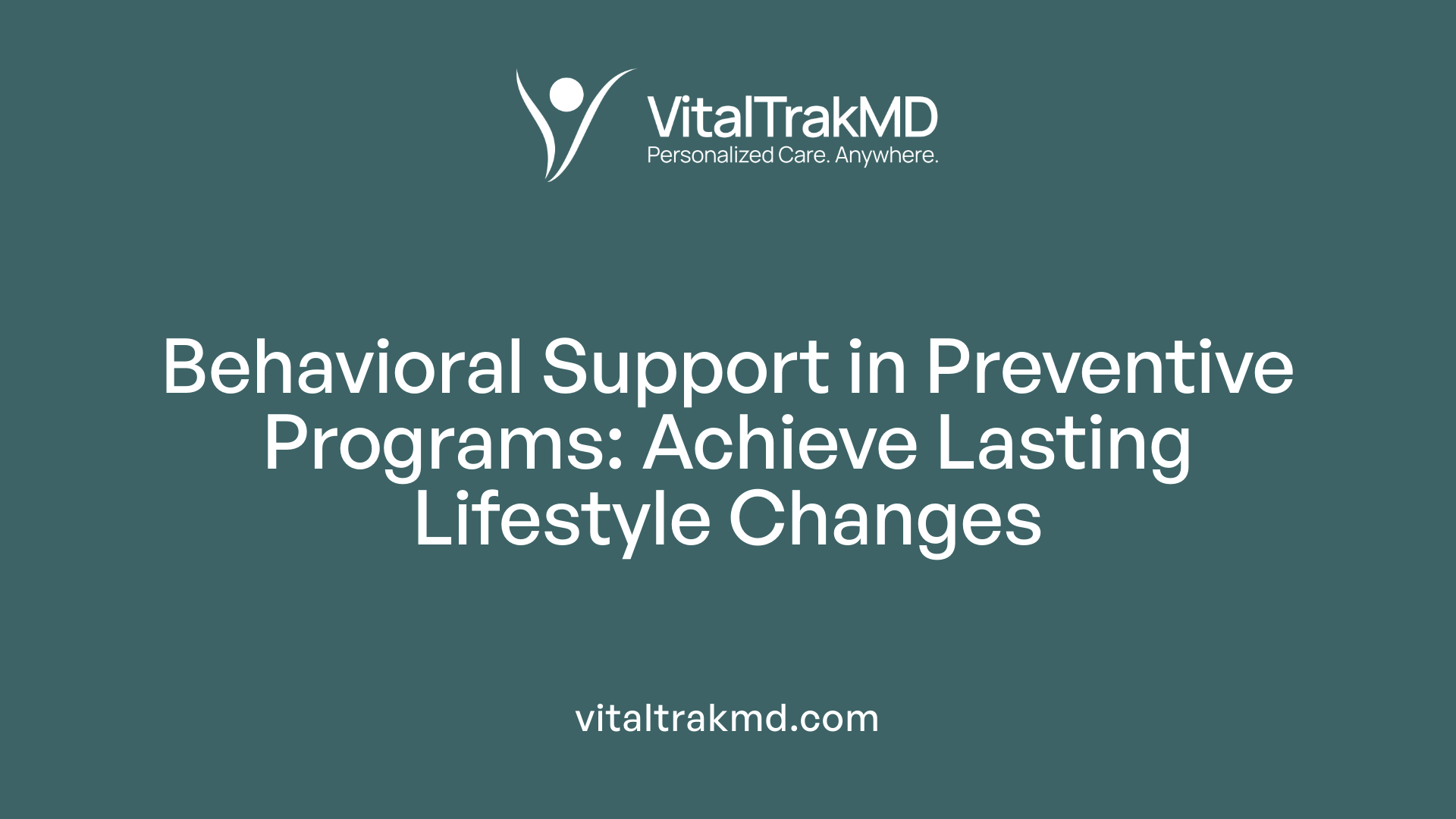How Hybrid Healthcare Creates Opportunities for Preventive Coaching

A New Frontier in Wellness and Preventive Care
Hybrid healthcare represents a transformative approach in health and wellness, blending in-person and virtual services to deliver comprehensive, personalized care. By integrating traditional medical practices with innovative preventive coaching, hybrid healthcare offers unprecedented opportunities for managing wellness and chronic disease prevention. This approach aligns with evolving healthcare needs post-pandemic, emphasizing holistic management, accessibility, and sustainable behavior change to improve health outcomes and reduce costs.
Holistic Care Foundations of Hybrid Healthcare

What is the approach of Hybrid Healthcare in health management?
Hybrid Healthcare embraces a holistic, results-based approach that considers the entire human body's interconnected systems. This method ensures that care addresses not only isolated symptoms but the overall system of the body, promoting balanced health and well-being.
Which integrative therapies are offered at Hybrid Healthcare?
The center utilizes a broad range of evidence-based, integrative therapies including:
- Chiropractic care
- Dry needling
- Manual therapy
- Neural activation therapy
- Soft tissue scraping
- Blood lab analysis
- Functional nutrition
- Cupping
These options blend traditional and modern techniques, allowing treatments to be tailored to individual needs based on scientific evidence.
How are rehabilitation and recovery programs personalized?
Rehabilitation programs at Hybrid Healthcare are highly customized for various injury types. They focus on restoring key physical capacities such as flexibility, strength, power, and endurance. This personalization aids in efficient recovery and enhances overall performance.
Further aiding recovery is the availability of a dedicated Recovery Room equipped with tools favored by elite athletes designed to reduce fatigue and soreness while boosting energy levels.
What aspects of health does Hybrid Healthcare emphasize beyond physical injuries?
The healthcare model extends its focus beyond just injury recovery to encompass a wide spectrum of health concerns. These include mental health issues like anxiety and depression, chronic conditions such as osteoporosis and cardiovascular diseases, and general wellness coaching. This broad focus ensures that patients receive comprehensive care that supports both physical and mental health, improving long-term outcomes.
Personalized Preventive Programs: Tailoring Health and Wellness Coaching

What are preventive health memberships and how do they work?
Preventive health memberships offer personalized wellness plans designed to focus on preventive care and lifestyle interventions. These memberships create targeted health assessments that identify specific health risks and tailor programs to address individual needs, promoting long-term well-being and reducing the likelihood of chronic disease.
How do personalized wellness plans contribute to health outcomes?
Personalized wellness plans are crafted based on comprehensive assessments to align with each individual’s unique health profile and goals. By addressing specific lifestyle factors such as nutrition, exercise, and stress management, these plans promote sustainable behavior change that supports improved overall health and disease prevention.
What is the role of health and wellness coaching in behavior change?
Health and wellness coaching plays a vital role by supporting behavior change through accountability, motivation, and education. Certified wellness coaches use proven techniques to help individuals set realistic goals, overcome obstacles, and maintain healthy habits. This approach is effective in preventing and managing conditions such as cardiovascular disease, obesity, and cancer.
How are lifestyle interventions integrated into primary care to enhance preventive care?
Lifestyle interventions often involve intensive behavioral support including recurring contacts with coaches, which helps adults achieve weight loss and increased physical activity. Primary care settings are increasingly embedding these interventions into their workflows via digital tools like EHR-automated messaging, wireless scale integrations, and referral systems for coaching services, making preventive care more accessible and scalable.
What evidence supports the effectiveness of these personalized preventive programs?
Feasibility studies have shown promising results where pragmatic approaches within primary care settings lead to meaningful weight loss and improved cardiovascular risk factors. The integration of automated monitoring and personalized coaching over extended periods enhances patient engagement and supports sustained health improvements.
| Aspect | Description | Benefit |
|---|---|---|
| Preventive Health Memberships | Subscription models providing tailored wellness programs and assessments | Encourages proactive health management |
| Personalized Wellness Plans | Custom health plans based on targeted assessments | Improves adherence and health outcomes |
| Health & Wellness Coaching | Behavior support by certified coaches utilizing evidence-based strategies | Facilitates lasting lifestyle changes |
| Primary Care Integration | Use of EHR tools and remote coaching to embed lifestyle interventions | Expands reach and efficiency of preventive care |
| Measurable Outcomes | Monitoring via digital tools and coaching leading to weight loss and risk reduction | Validates effectiveness and guides care adjustments |
Technology’s Role: Enhancing Accessibility and Engagement in Preventive Coaching

How does telemedicine and virtual care improve access to preventive coaching?
Telemedicine and virtual care enable remote consultations, making healthcare providers more accessible to individuals regardless of location. This flexibility facilitates regular health monitoring and continuous engagement in preventive care without the need for in-person appointments.
What tools are used for remote consultations and monitoring?
Remote consultations often utilize video calls and phone sessions, augmented by digital tools such as apps and wearable tracking devices. These tools help monitor health metrics like physical activity, weight, and other vital signs, allowing healthcare professionals to tailor coaching effectively.
How do apps, videos, and tracking devices support coaching?
Apps and videos provide interactive educational content and guided exercises, engaging users in behavior change activities. Tracking devices wirelessly collect data such as weight or physical activity, feeding information back to healthcare providers and coaches to adjust plans and motivate users.
In what ways do automated messaging and electronic self-monitoring assist patients?
Automated motivational messaging, sent via embedded electronic health record (EHR) systems or apps, offers timely encouragement and reminders. Electronic self-monitoring tools, including wireless scales, allow patients to track their progress actively, enhancing accountability and fostering sustained lifestyle changes.
How are hybrid coaching models integrating technology for delivery?
Hybrid models combine virtual and in-person coaching sessions, enhanced with technology-based resources. This approach increases accessibility and personalization, allowing tailored wellness programs that adapt to user preferences and needs while leveraging digital engagement tools for effectiveness.
Technology is thus a pivotal element in modern preventive health coaching, broadening reach and strengthening adherence through multifaceted digital support systems.
Combining Clinical Care with Preventive Coaching to Improve Outcomes

What are Direct Primary Care and Concierge Medicine?
Direct Primary Care (DPC) provides patients with personalized, cost-effective healthcare by offering direct access to primary care physicians. This reduces administrative burdens and promotes strong patient-physician relationships.
Concierge Medicine complements this by delivering an exclusive healthcare experience characterized by longer, more thorough appointments, increasing patient satisfaction and adherence to treatment plans.
How is Wellness Coaching Integrated with Fitness and Behavioral Health?
Hybrid healthcare centers blend wellness coaching with fitness training and behavioral health services to create a comprehensive care network. Certified wellness coaches serve as accountability partners, helping individuals set realistic goals and adopt sustainable healthy lifestyles.
Programs are tailored for both virtual and in-person delivery, enhancing accessibility and personalization. The integration supports prevention and management of conditions like obesity, cardiovascular disease, and anxiety.
What Collaborative Services Enhance Patient Outcomes?
Collaborative health services combine direct primary care, wellness coaching, fitness, and behavioral health. For example, Premise Health offers coordinated programs that include weight management, stress reduction, tobacco cessation, and life satisfaction coaching. These multidisciplinary efforts leverage technology such as member portals for activity tracking and goal monitoring to improve engagement.
What Evidence Supports Clinically Validated Outcomes?
Clinical evidence underscores the success of integrating clinical care with preventive coaching. Intensive lifestyle interventions embedded in primary care have led to meaningful weight loss and reduction of chronic disease risk factors such as blood glucose, blood pressure, and cholesterol.
Studies demonstrate that sustained behavioral coaching with recurring contact results in higher success rates for achieving weight loss and physical activity goals. Early trials using electronic health record–based messaging and wireless monitoring have proven feasible and promising for weight loss in real-world settings.
This fusion of personalized clinical care with preventive coaching models significantly improves chronic disease management and long-term health outcomes.
Employer and Community Initiatives Supporting Preventive Health Engagement
What Are Employer-Sponsored Preventive Health Plans?
Employer-sponsored preventive health plans are programs designed to encourage employees to actively participate in maintaining and improving their health. These plans typically cover preventive services such as health screenings and vaccinations, while also reducing out-of-pocket expenses for participants. Incentives offered within these plans encourage sustained engagement, ultimately aiming to enhance workforce wellbeing and reduce overall health costs.
How Are Governments Expanding Access to Health and Wellness Coaching?
Governments in several countries—including the UK, Singapore, and Australia—are increasing support for health and wellness coaching through community-based initiatives. These programs often offer free or subsidized services to make coaching more accessible. The goal is to empower individuals to adopt healthier lifestyles by reinforcing preventive care principles such as nutrition, exercise, and stress management.
How Are Community and Private Sector Programs Adapting to Virtual Coaching?
In response to challenges posed by COVID-19, both community and private sectors have shifted largely to virtual coaching models. This shift includes remote one-on-one and group sessions that provide flexible and convenient access to wellness support. Virtual platforms incorporate technologies like apps and tracking devices, enabling ongoing engagement and personalized goal tracking, which help lower barriers to participation and reduce costs.
What Incentives and Cost Reductions Encourage Participation?
To boost preventive health engagement, many initiatives include financial and non-financial incentives such as reduced premiums, lower copays, and rewards for meeting wellness milestones. These strategies not only motivate participation but also aim to decrease long-term healthcare costs by fostering healthy behaviors early on. Employers and programs increasingly use such incentives to maintain high levels of involvement and promote sustained health improvements.
| Initiative Type | Description | Benefits |
|---|---|---|
| Employer-Sponsored Plans | Preventive health coverage with incentives | Reduces expenses, increases engagement |
| Government-Supported Coaching | Community-based free or subsidized wellness coaching | Improves access, fosters healthier populations |
| Virtual Coaching Adaptations | Remote coaching via apps and devices | Enhances convenience, scalability, and adherence |
| Incentive Programs | Financial rewards and reduced premiums | Drives participation, lowers long-term costs |
Behavioral Science and Coaching Effectiveness in Chronic Disease Prevention

What behavioral choices significantly reduce the risk of chronic diseases?
The landmark EPIC study identified four critical lifestyle behaviors associated with a substantial reduction—up to 78%—in the risk of chronic diseases. These include refraining from smoking, engaging in at least 3.5 hours of exercise weekly, consuming a plant-forward diet, and maintaining a healthy body weight. Together, these practices target the root causes of conditions such as cardiovascular disease, obesity, and cancer.
Why is sustained behavioral intervention important for disease prevention?
Adults who receive ongoing behavioral interventions with regular contact over months or years demonstrate higher success in achieving weight loss and increasing physical activity. Sustained engagement helps embed healthy habits and supports long-term lifestyle change, which is essential for preventing and managing chronic diseases. Interventions that integrate repeated coaching sessions provide necessary reinforcement and motivation.
What roles do certified coaches and accountability partners play?
Certified wellness coaches, trained through organizations like Wellcoaches® and the American College of Sports Medicine, employ evidence-based techniques to guide individuals. These coaches serve as accountability partners, helping set realistic, personalized goals while supporting a holistic healthy lifestyle. Confidential and personalized coaching—delivered virtually or in-person—enhances accessibility and helps individuals maintain motivation and track progress effectively.
How does coaching target major chronic diseases?
Behavioral coaching programs are strategically designed to address prominent chronic conditions such as cardiovascular disease, obesity, and cancer by focusing on improving nutrition, encouraging physical activity, managing stress, and facilitating tobacco cessation. By emphasizing prevention through sustained behavioral change, these programs contribute to improved clinical outcomes and overall health stability.
Overcoming Challenges and Scaling Preventive Coaching Within Healthcare Systems
What Are the Resource and Workflow Constraints in Primary Care?
Primary care settings face notable challenges when integrating intensive lifestyle interventions (ILIs) due to limited resources and rigid workflows. Busy clinical schedules leave little room for extended behavioral coaching sessions. Additionally, the high demand for acute care often diverts attention from preventive services, which require sustained engagement. These constraints hinder regular follow-ups, essential for long-term weight loss and cardiovascular risk management.
How Do Pragmatic EHR-Embedded Strategies Help Address These Challenges?
Embedding preventive coaching strategies directly within electronic health records (EHRs) presents an innovative solution. Such integration allows for automated messaging, electronic self-monitoring, and referrals without significant disruption to providers’ workflows. For instance, automated messages can prompt patients to engage in weight monitoring through wireless scales, while referral systems can efficiently connect patients with lifestyle coaches or fitness programs.
Is Automated and Personalized Intervention Feasible in Primary Care?
Evidence from feasibility trials demonstrates that combining automated technology with personalized coaching support is practicable within primary care. In one study, 426 patients received EHR-generated messages, resulting in 80 enrollments and 48 patients achieving weight loss at six months, with 12 attaining clinically meaningful reductions. This approach reduces burden on clinical staff while maintaining effective patient engagement.
How Can These Programs Scale Within Existing Health Ecosystems?
Integrating coaching programs like Vida’s obesity care and Premise Health’s wellness coaching within current health plans and benefit platforms enables broad scalability. These models incorporate behavioral health and personalized coaching, leveraging technology to support ongoing monitoring and goal tracking. By reducing the frequency of in-person interactions and utilizing virtual tools such as apps and group coaching, health systems can increase reach and lower costs while supporting sustained behavior change across diverse patient populations.
The Future of Health: Empowerment Through Hybrid Preventive Coaching
Hybrid healthcare's integration of personalized coaching with medical and wellness services showcases a paradigm shift toward proactive, preventive care. By leveraging technology, holistic health strategies, and evidence-based coaching, it empowers individuals to take charge of their wellness journeys. The evolution of these hybrid models addresses accessibility challenges, promotes sustainable behavior change, and improves clinical outcomes, positioning preventive coaching as a cornerstone of future healthcare transformation.
References
Recent articles
Want to Feel Better and Live Healthier?
Join hundreds of patients taking control of their health with personalized care that fits their life – not the other way around.
Rated 4.8/5 by 32+ customers







